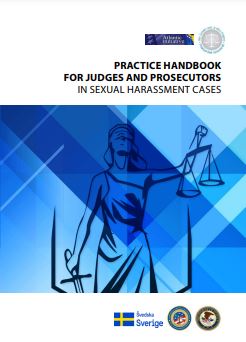Practice Handbook for Judges and Prosecutors in Sexual Harassment Cases
Practice Handbook for Judges and Prosecutors in Sexual Harassment Cases
Author(s): Majda Halilović, Adnan Kadribašić, Nenad Galić, Edin Buljubašić, Damir Čačković, Janja Jovanović, Katica Jozak Mađar, Mihaela Jovanović, Faruk Latifović, Milanko Kajganić, Olga Pantić, Svjetlana Milišić-Veličkovski, Snežana Živković, Slavica Tadić, Ljiljana Stevanović, Mersudin Pružan
Subject(s): Gender Studies, Criminal Law, Studies in violence and power, Court case
Published by: Atlantska inicijativa: Udruženje za promicanje euroatlantskih integracija BiH
Keywords: BiH; judges; prosecutors; sexual harassment; practice handbook;
Summary/Abstract: From December 2017 through September 2018, as part of the Gender and Justice Project in Bosnia and Herzegovina, the Atlantic Initiative facilitated a panel of thirteen judges and prosecutors who developed this Practice Handbook for handling sexual harassment cases. The work of the panel was supported by the Embassy of the Kingdom of Sweden to Bosnia and Herzegovina and the Office of Overseas Prosecutorial Development, Assistance and Training (OPDAT) of the United States Department of Justice. The panelists primarily considered the legal framework, the case law, and the legal aspects of sexual harassment, but they also analyzed psychological and social theories and studies on sexual harassment that are relevant to a comprehensive understanding of the topic and recognition of the individual and social dynamics related to this issue. This Practice Handbook, with references to the law in Bosnia and Herzegovina (BiH), as well as international case law and literature, presents the conclusions, recommendations, and key findings of panelists. The Handbook is divided into seven chapters, to be used together and separately as a resource for handling cases of sexual harassment. Chapter One presents the causes and consequences of sexual harassment and considers the dynamics of harassment, perpetrator profiles, and myths and stereotypes related to gender. Chapter Two outlines the legal framework and case law related to sexual harassment, with respect to establishing liability and presenting evidence in sexual harassment cases. Chapter Three discusses the establishment of civil liability for the existence of sexual harassment as a form of discrimination. Chapter Four introduces the practical elements of the Handbook. Chapter Five and Six present the recommendations of the panel for handling proceedings in criminal sexual harassment cases. Chapters Seven addresses the recommendations of the panel for civil proceedings in sexual harassment cases. Chapter Eight discusses minor offence proceedings for a failure to undertake appropriate measures to prevent sexual harassment. In BiH, sexual harassment was recognized and regulated by law for the first time in 2003 by the Law on Gender Equality, and later by the Law on Prohibition of Discrimination. As of 2016, sexual harassment is also addressed by labor laws at the entity level. However, despite this legislation and numerous activities aimed at supporting gender equality, data from the European Union and the region demonstrate that sexual harassment is a widespread occurrence with serious consequences; and in BiH, sexual harassment receives insufficient attention and is, in many cases, trivialized. Further, because sexual harassment is not appropriately recognized, sexual harassment cases in BiH mostly remain unreported. And though fifteen years have passed since sexual harassment was legally defined in the country, only a handful of cases have been handled by the judiciary, indicating that court practices in this area are inadequately developed. For all these reasons, the Atlantic Initiative has been working since 2014 to build the capacity of judicial institutions in BiH to prevent and recognize sexual harassment. This has resulted in the establishment of a comprehensive prevention mechanism in all judicial institutions in BiH as well as in several higher education institutions. This work on prevention revealed the need for in-depth consideration of both criminal and civil sexual harassment cases, and also the need to engage in capacity building among judges and prosecutors who handle these cases.
Series: Atlantska inicijativa - Policy Paper
- Page Count: 53
- Publication Year: 2019
- Language: English
- Introduction
- Content File-PDF

